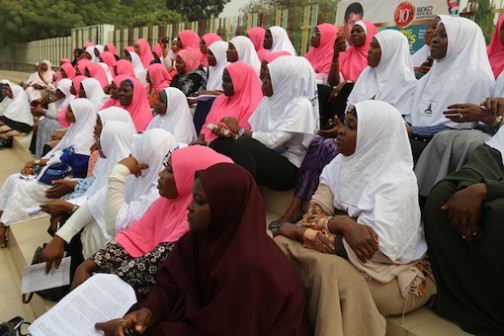Just as needle injects content into the body, poverty remains a systemic menace breeding insecurity, socio-economic deprivation and instability, especially in Northern part of the country where high level illiteracy and child destitution prevail.
Poverty in the analysis of United Nations Children’s Fund (UNICEF), is a denial of choices and opportunities, a violation of human dignity. By this, it denotes susceptibility to violence, inaccessibility to basic needs, economic incapacitation and social exclusion.
The resultant impact of poverty continues to prey on community and family’s socio-economic decisions with rising perception of child marriage and Almajiri system as opportunities to escape chronic poverty or alleviate socio-economic burdens.
Early child marriage hinders girl child’s ability to pursue an education and gain independence across the north.
As part of the wrong socio-cultural attitudes to education, girls are often instructed to stay home and perform domestic responsibilities while their brothers head to the classroom. This automatically manifests in child marriage, early pregnancy, redundant productivity, gender-based violence, and persistent cultural biases propagating the cycle of gender inequality in the region.
Child marriage as one of the most prevalent forms of sexual exploitation of girls robs them of critical educational and economic empowerment opportunities and prevents them from attaining their full potential. The child brides are effectually short-changed, as their education ended; their emotional and social developments are interrupted.
In northern Nigeria, child marriage phenomenon is exacerbated by recurring humanitarian disaster invading the citizens’ rights and standards of living as well as accelerating the level of Internal Displaced Persons (IDPs) and Refugees.
The continued exposure to disaster has posed a negative effect on the enrolment of girl child into school with high dropout rate and slim chance for new students to enter a classroom. Schools, if not destroyed, have a diminishing number of staff and material and thus the quality of education decreases. The honour of girl child is threatened by the effects of insecurity in the region. That is, if they are neither busy in school, girls are vulnerable to forceful marriage.
A report by UNICEF has revealed that trafficking of girl children for the purpose of domestic service, prostitution and other forms of exploitative labour remains a widespread phenomenon in Nigeria.
In November 2016, Nigeria became the 17th country to launch the African Union campaign to end child marriage. This was commemorated with the launching of a strategic vision by the Ministry of Women Affairs and Social Development to reduce child marriage by 40% by 2020, and end the practice entirely by 2030.
In 2017, a report by UNICEF focusing on the child marriage rates across the globe reveals unfavourable indices in Nigeria, where 43% of girls are married off before their 18th birthday, while 17% are married before 15th. This prevalence varies from one region to another with estimated 76% and 10% occurrences in the North West and South East regions respectively.
Reports across the Northern region reveal that early child marriage is mostly common among the poor people than the rich. Girls from the poor backgrounds are approximately thrice as likely to be married before 18 compared to their rich counterparts.
Nigeria adopted the national Child Rights Act in 2003 to domesticate the international Convention on the Rights of the Child. Marriage before the age of 18 is a fundamental violation of human rights as enshrined under the Act which sets minimum age of marriage at 18 years of age. So far, state-wide Child Rights Acts have been passed in 24 of the Nigeria’s 36 states, with Enugu being the most recent to enact the law in December 2016. Domestication and implementation of the Act suffer setback in the North for the prevalent socio-cultural factors.
Similarly, the United Nations Convention on Consent to Marriage, Minimum Age for Marriage and Registration of Marriages stipulated that “No marriage shall be legally entered into without the full and free consent of both parties, such consent to be expressed by them in person after due publicity and in the presence of the authority competent to solemnize the marriage and of witnesses, as prescribed by law.”
The Convention continued: “Notwithstanding anything in paragraph 1 above, it shall not be necessary for one of the parties to be present when the competent authority is satisfied that the circumstances are exceptional and that the party has, before a competent authority and in such manner as may be prescribed by law, expressed and not withdrawn consent.
“States Parties to the present Convention shall take legislative action to specify a minimum age for marriage. No marriage shall be legally entered into by any person under this age, except where a competent authority has granted a dispensation as to age, for serious reasons, in the interest of the intending spouses.”
Many factors interact to place a girl at risk of marriage, including poverty, the perception that marriage will provide ‘protection’, family honour, social norms, customary or religious laws that condone the practice, an inadequate legislative framework and the state of a country’s civil registration system.
Child marriage often compromises a girl’s development with resultant early pregnancy and social isolation, interrupting her schooling, limiting her opportunities for career and vocational advancement and placing her at increased risk of domestic violence. Child marriage also affects boys, but to a lesser degree than girls.
Most poor households in the North attach marriage to economic gains and as such marry off their girl children out early in other to shake off economic burdens and raise financial support for the family which in most case is not always so.
It leads to further impoverishment of the girl child, as she is withdrawn from school with little or no skill to live a healthy and empowered life. They are married off at such an age too early to acquire meaningful knowledge on self-reliance and self-empowerment to effectively compete with their educated counterparts.
Apart from increased reproductive health risk, they also lack the knowledge and ability to demand justice when their rights are violated either by their husbands or the society at large.
Child marriage is a contributory factor to social and health challenges in Nigeria. All relevant stakeholders must work as a society to figure out ways to give the most vulnerable in the society a positive control over their future. It has subjected the girl children to continued sexual abuse, and possible physical psychological violence by their supposed spouses.
While there have been fruitless efforts at addressing early child marriage and Almajiri system in the North owing to rampart socio-cultural beliefs, education remains to be the only plausible way to successfully combat the developmental threat. Educated families are more likely to practice family planning, and thus avoid having more children beyond their economic capacity. Educated parents are more likely to want education for their children as well.
The Almajiri system in Northern Nigeria has long outlived the purpose it was earlier set to accomplish. Instead of being a breeding ground for the learned ‘Ulamas’ who are trained bearers of Islam as a religion, it has unfortunately become one of the major causes of poverty in Northern Nigeria and a veritable avenue for the mass production of miscreants, thugs and vagabonds.
Through the system, children between the ages of 6 to 12 years are displaced mostly from rural areas by their ignorant parents to the cities without provision to study Holy Qur’an, under harsh and despicable conditions. Apart from roaming the streets with cups and begging while dressed in rags, scavenging on food remnants, the children are involved in various kinds of forced labour like, and live under bridges, motor parks, mosques, market stalls. This further exposes to different kinds of health, physical and psychological hazards.
The awful practice has resulted anti-societal behaviours with many Almajiri children losing their lives to violence, jungle justice, hunger and diseases. After successful completion of the Holy Qur’an, the have prospects mainly in petty menial jobs. They are condemned to menial jobs, since they have no skills at hand. They resort to pushing wheelbarrow, touting and so on to earn a living. They remain as untrained armies available to anybody poised to ferment trouble. They have their own axes to grind against their parents, authorities and the society at large. The system must be stopped, reviewed and integrated into our educational system.
Meanwhile, poverty, poor educational attainment and strong social and religious traditions are drivers of child marriage and street begging in Nigeria. Most Nigerians agree that the current insecurity is worsened or aided by the high level of poverty in the northern part of the country.





